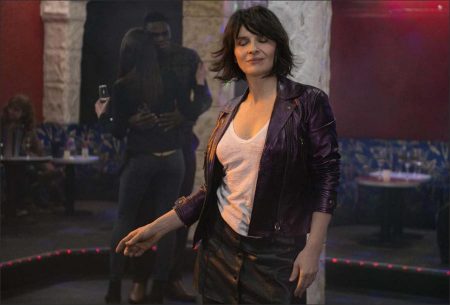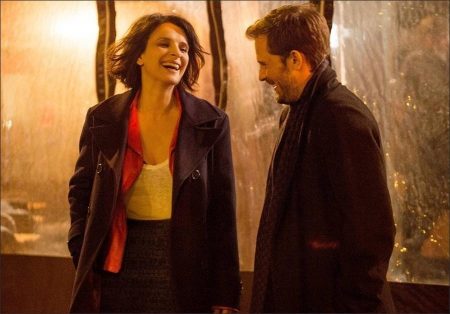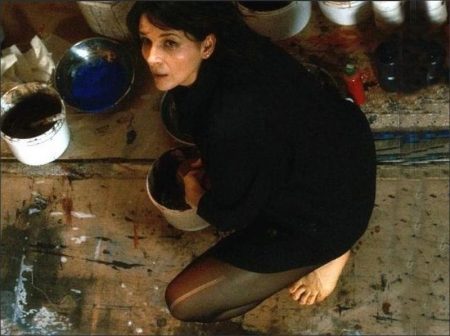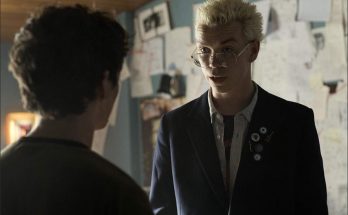Let the Sunshine In Movie Storyline. In Bright Sunshine In, the girl in love is played by Juliette Binoche, who is outstanding in this role, which fits her like a glove: the role of Isabelle, a 50-year-old artist who is separated from the father of her child and suffers terribly from loneliness, which leads to each and every failure in a long series of mediocre flings. Indeed, Binoche plays this woman with moving vulnerability, but without distracting us from the somewhat ridiculous dimension of her routine, with its up and downs that come in unpredictable succession.
As the movements of the soul that rock Isabelle each time – constantly bringing her to tears, and the endless excuses and thanks – are really over inexplicable people, namely a bunch of wretches, we could say: the scornful married banker (Xavier Beauvois), the tortured actor (Nicolas Duvauchelle), the insistent neighbour who’s always inviting her to go to the countryside with him with no ulterior motive, the false friend who undermines the one half-decent relationship she enters into…
Film Review for Let the Sunshine In
“Like in a tacky bedroom farce?” a middle-aged lothario asks, bewildered, when an angry lover throws him out midway through “Let the Sunshine In.” He’s in the wrong, though he has reason to be incredulous: He’s in a Claire Denis movie, after all, and “tacky bedroom farce” is about as far from her highly refined repertoire as it’s possible to get.
Luckily, it remains so by the end of this exquisitely judged romantic comedy, which maps out the transient pleasures, pitfalls and emotional culs-de-sac of mid-life dating with all the close human scrutiny and hot-blooded sensual detail of her sterner dramatic work. Perfectly small rather than slight, and radiantly carried by Juliette Binoche — in a light-touch tour de force to be filed alongside her work in Kiarostami’s “Certified Copy” — this turns out to be a subtler departure than it outwardly appears for Denis, most evoking her other Parisienne drifting-hearts study, “Friday Night,” in its bittersweet tone.
If the humor in “Let the Sunshine In” is slightly amped up by its maker’s usual standards, it hardly reaches for its chuckles: Denis, like the best artists, knows all human life is a comedy, albeit with an unhappy ending. That gentle wryness, coupled with an ensemble heavy on French A-listers, should make this one of her more commercially viable outings following its premiere as the opening film of the Directors’ Fortnight at Cannes. (Four years after the equally rigorous, tonally opposite “Bastards” played in Un Certain Regard, “Let the Sunshine In” again invites the question of just what this modern master must do to get a Competition slot.)
Denis’s film may conceivable be dismissed as a slender diversion in some quarters — notably, that quadrant of society (and, still, the film industry) that regards the inner lives of women of a certain age as a subject of secondary concern. Unhappily divorced artist Isabelle (Binoche) has certainly tangled with her fair share of men who think that way, yet persists in a repeatedly waylaid search for true love. What that might feel like, and with whom, she has no idea: The loose, airy narrative of “Let the Sunshine In” knits together a series of her dalliances with men of various shapes, types, ages and neuroses, with nothing in common save for the fact that they have nothing in common with Isabelle either.
Collaborating with novelist and playwright Christine Angot, Denis initially approached the project as a potential adaptation of Roland Barthes’ volume “A Lover’s Discourse: Fragments.” What has emerged remains very much a lover’s discourse, but Denis and Angot’s ultimately original screenplay takes a jointly personal, expressly feminist point of view, as Isabelle repeatedly muses aloud on the possibilities (and impossibilities) of love and sex for women like her — and, by extension, like the filmmakers.
This isn’t uncharted territory on screen — one might even view “Let the Sunshine In” as a parallel-universe Nancy Meyers movie — but it’s rare for stories of older female singledom to turn the mirror inward quite so candidly. Denis and Angot mine ample, acid-laced comedy from the callousness or carelessness with which Isabelle is treated by men: “You are charming, but my wife is extraordinary,” says one of her lovers, married banker Vincent (a superb Xavier Beauvois). But they are also unsparing on the cruelty with which she treats herself, whether by chasing obvious non-starter suitors on a masochistic fast track to heartbreak, or by excessive self-scolding when something lasting once again eludes her.
Coldly dismissive of any long-term romantic future but brattishly insistent on sex (“I just got in from Brazil and felt like banging you,” he leers), Vincent is the least palatable of Isabelle’s wrong choices; on the flipside, a dreamy married actor (Nicolas Duvauchelle) is cagey when it comes to carnal knowledge but finds in Isabelle an emotional sounding-board.
Denis reserves some compassion even for her worst-behaved characters, every one of which is presented as needy in one way or another; the trouble is that no one’s void, however, quite complements anyone else’s. A hand-picked ensemble makes sure no passing glance goes to waste. Valeria Bruni Tedeschi has mere seconds to etch a piercing mirror image to Isabelle’s internal agony, while Gerard Depardieu gamely helps shoulder the film’s most unexpectedly whimsical turn — his blithe tête-à-tête rapport with Binoche belying his publicly stated animosity toward the actress in years past.
Still, this is the leading lady’s show. Binoche, like her compatriot Isabelle Huppert, is an actress so adept at serenely conducting inner turmoil that we risk taking their range of notes and tones for granted. Even by her standards, however, this is complex, quietly symphonic work, that extraordinary face as mesmerizing when in full, streaky-cheeked crying mode as when pensively staring at nothing in particular. Not many actors could find quite as many variations to play in Denis and Angot’s deliberately fractured dialogue: She’s often tongue-tied in love and hate alike, comic embarrassment and tragic insecurity written into every pause and stumble.
Yet “Let the Sunshine In” is not a pessimistic film, or even an entirely unromantic one. Aided by the warmly shadowed intimacy of Agnes Godard’s camerawork, Denis identifies fleeting joys and hormonal highs in the dating chase: be it the tactile thrill of one lonely hand meeting another, or the tense pause that comes just after a conversation runs dry, and just before silent lips find something else to do.
The film’s most sustained moment of bliss — not a long one, admittedly — comes in a spontaneous, slightly drunken barroom dance, as Isabelle’s solo swaying finds a gallant, unsolicited partner. The song is Etta James’s “At Last,” chosen with Denis’s characteristically precise ear for the right musical cue: It’s the ideal song for its woozy moment, though the tender irony is that, if Isabelle’s love has come along, it’s probably only for the time being.
Let the Sunshine In (French: Un beau soleil intérieur), or Bright Sunshine In, is a 2017 French film directed by Claire Denis. The film is an adaptation of Roland Barthes’s 1977 text A Lover’s Discourse: Fragments (French: Fragments d’un discours amoureux). Novelist Christine Angot and frequent Denis collaborator Jean-Pol Fargeau have both been reported as Denis’s co-writers on the project. It opened the Directors’ Fortnight section of the 2017 Cannes Film Festival. At Cannes in won the SACD Award.
Let the Sunshine In (2018)
Directed by: Claire Denis
Starring: Juliette Binoche, Xavier Beauvois, Philippe Katerine, Josiane Balasko, Sandrine Dumas, Nicolas Duvauchelle, Alex Descas, Laurent Grévill, Valeria Bruni Tedeschi, Gérard Depardieu
Screenplay by: Christine Angot, Claire Denis
Production Design by: Arnaud de Moleron
Cinematography by: Agnès Godard
Film Editing by: Guy Lecorne
Makeup Department: Turid Follvik
Music by: Stuart A. Staples
Distributed by: Curiosa Films
Delease Date: April 6, 2018
Visits: 300






